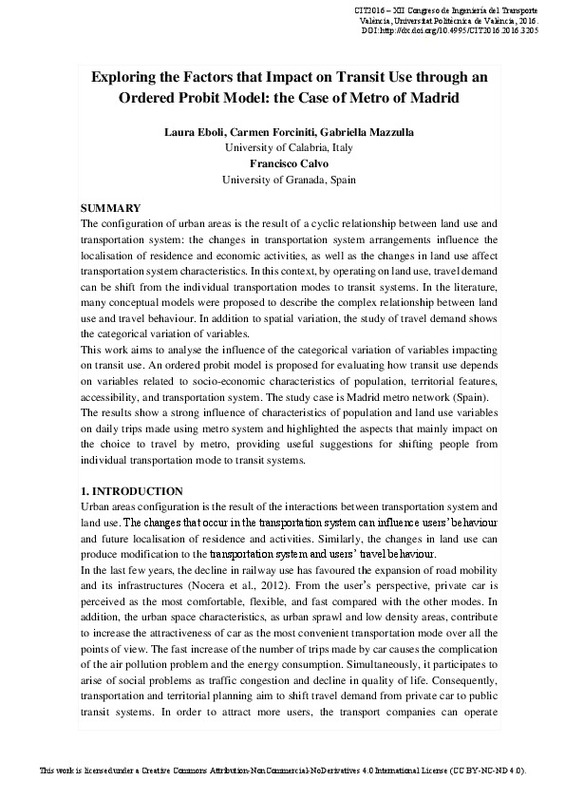JavaScript is disabled for your browser. Some features of this site may not work without it.
Buscar en RiuNet
Listar
Mi cuenta
Estadísticas
Ayuda RiuNet
Admin. UPV
Exploring the Factors that Impact on Transit Use through an Ordered Probit Model: the Case of Metro of Madrid
Mostrar el registro sencillo del ítem
Ficheros en el ítem
| dc.contributor.author | Eboli, Laura
|
es_ES |
| dc.contributor.author | Forciniti, Carmen
|
es_ES |
| dc.contributor.author | Mazzulla, Gabriella
|
es_ES |
| dc.contributor.author | Calvo, Francisco
|
es_ES |
| dc.coverage.spatial | east=-3.7037901999999576; north=40.4167754; name= Madrid, Espanya | |
| dc.date.accessioned | 2017-10-20T09:30:30Z | |
| dc.date.available | 2017-10-20T09:30:30Z | |
| dc.date.issued | 2016-06-01 | |
| dc.identifier.isbn | 9788460899600 | |
| dc.identifier.uri | http://hdl.handle.net/10251/89725 | |
| dc.description.abstract | [EN] The configuration of urban areas is the result of a cyclic relationship between land use and transportation system: the changes in transportation system arrangements influence the localisation of residence and economic activities, as well as the changes in land use affect transportation system characteristics. In this context, by operating on land use, travel demand can be shift from the individual transportation modes to transit systems. In the literature, many conceptual models were proposed to describe the complex relationship between land use and travel behaviour. In addition to spatial variation, the study of travel demand shows the categorical variation of variables. This work aims to analyse the influence of the categorical variation of variables impacting on transit use. An ordered probit model is proposed for evaluating how transit use depends on variables related to socio-economic characteristics of population, territorial features, accessibility, and transportation system. The study case is Madrid metro network (Spain). The results show a strong influence of characteristics of population and land use variables on daily trips made using metro system and highlighted the aspects that mainly impact on the choice to travel by metro, providing useful suggestions for shifting people from individual transportation mode to transit systems. | es_ES |
| dc.format.extent | 8 | es_ES |
| dc.language | Inglés | es_ES |
| dc.publisher | Editorial Universitat Politècnica de València | es_ES |
| dc.relation.ispartof | XII Congreso de ingeniería del transporte. 7, 8 y 9 de Junio, Valencia (España) | es_ES |
| dc.rights | Reconocimiento - No comercial - Sin obra derivada (by-nc-nd) | es_ES |
| dc.subject | Land use and transport interactions | es_ES |
| dc.subject | Transit systems | es_ES |
| dc.subject | Ordered probit models | es_ES |
| dc.title | Exploring the Factors that Impact on Transit Use through an Ordered Probit Model: the Case of Metro of Madrid | es_ES |
| dc.type | Capítulo de libro | es_ES |
| dc.type | Comunicación en congreso | es_ES |
| dc.identifier.doi | 10.4995/CIT2016.2015.3205 | |
| dc.rights.accessRights | Abierto | es_ES |
| dc.description.bibliographicCitation | Eboli, L.; Forciniti, C.; Mazzulla, G.; Calvo, F. (2016). Exploring the Factors that Impact on Transit Use through an Ordered Probit Model: the Case of Metro of Madrid. En XII Congreso de ingeniería del transporte. 7, 8 y 9 de Junio, Valencia (España). Editorial Universitat Politècnica de València. 992-999. https://doi.org/10.4995/CIT2016.2015.3205 | es_ES |
| dc.description.accrualMethod | OCS | es_ES |
| dc.relation.conferencename | CIT2016. Congreso de Ingeniería del Transporte | es_ES |
| dc.relation.conferencedate | June 07-09,2016 | es_ES |
| dc.relation.conferenceplace | Valencia, Spain | es_ES |
| dc.relation.publisherversion | http://ocs.editorial.upv.es/index.php/CIT/CIT2016/paper/view/3205 | es_ES |
| dc.description.upvformatpinicio | 992 | es_ES |
| dc.description.upvformatpfin | 999 | es_ES |
| dc.type.version | info:eu-repo/semantics/publishedVersion | es_ES |
| dc.relation.pasarela | OCS\3205 | es_ES |








